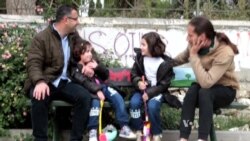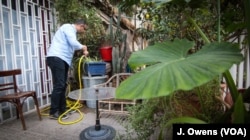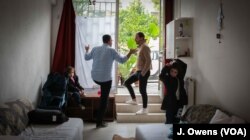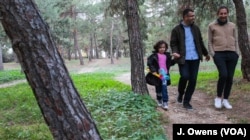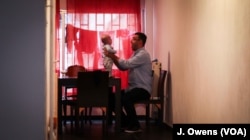As he tends to the flowers outside his home, a stranger's home, Ammar Othman is reminded of the small garden he cultivated back in Syria before he and his family fled the war.
“We used to have jasmine, and I love to smell it as I walk through Athens," he says, smiling at the thought of his old house in al-Bab, Aleppo province, now occupied by Islamic State.
After months spent in Greek refugee camps, Ammar, his wife Naheed and their three children finally have a space to call their own: an apartment given to them by someone they had never met before.
The story of how they got there begins almost a century ago.
Before Izmir
The Othmans live rent-free in a house nestled down a leafy road in suburban Athens, two floors below 38-year-old Adonis Tsangouris, whose family owns the building.
Like many people, when Tsangouris saw video of people risking their lives on flimsy boats to make it to Greece, he was deeply moved. But their journeys resonated with his own family history.
In 1922, his grandparents fled to Athens from their home in Smyrna, on Turkey's coast, after being persecuted by Turkish forces that had regained control of the city from the Greek army. The event formed part of a wider persecution of Greeks that is now annually commemorated in Greece as a genocide.
Today, the former Smyrna is called Izmir, a point of departure for refugees, including the Othmans, hoping to find a way into Europe.
Tsangouris, who has also opened up his building's fourth floor to an Iraqi family, recounted the songs his grandmother used to sing to him as a child.
“I only remember one line: 'And the boat rolled alone into the deep water.' As I was looking at these boats, my grandma's lyrics came to my mind,” he explained. His family wanted to offer the apartments in memory of his grandparents.
Home for hope
It is not just the Tsangouris family that has decided to help.
Under a plan named Home for Hope, since April, around 600 refugees like the Othmans have been given an apartment to live in or are sharing a home with Greek hosts.
It is part of a broader effort to offer better living conditions to some of the 50,000-plus refugees stuck in Greece and unable to leave the country since land borders closed this spring.
Most of the refugees are residing in state-run camps of hugely varying quality, and some continue to live in tents.
"This is about offering more human and decent living conditions,” explained Sophia Ioannou of Solidarity Now, the organization behind Home for Hope.
The plan sought to make the best of Greece’s dire economic situation, which had driven Greeks from renting to living with their parents, leaving empty apartments, she said.
Getting along well
The Othmans deeply appreciate their host’s gesture and the home they moved into two months ago.
“The first thing I felt when I got here is relief,” Ammar explains.
“It is knowing that your family will be comfortable in a home, that we will be able to live independently. That my children will suffer no more illness or have to worry about insects."
Past, present and future
Yet while the present may be more secure, the past and the future remain a source of tension.
Ammar’s wife Naheed is upset. Some of her relatives remain in their home town in Syria, and a fresh eruption in clashes has left her anxious for their safety.
Meanwhile, like the others benefiting from Home for Hope, the family must wait to hear if they can be resettled elsewhere in Europe.
Such is the state of limbo experienced by all those trapped within Greece by events well beyond their control, some of whom are likely to stay in the country not just for months, but years.
Home for Hope, a pilot project, is likely to be replaced by a new approach next year, explained Solidarity Now’s Ioannou.
“We need to think bigger” before calling on the state to do more, she said of those aiding refugees.
“The next step is to think longer term and create more projects that will integrate people into our societies. This population is now part of our reality.”
A better future
Yet despite the uncertainty ahead, speaking in the garden that reminds him of a life that was destroyed by war, Ammar is heartened.
He and his wife still believe a better future is possible for their two young daughters and 4-month-old son Omar.
“We risked our lives and traveled over sea so that our future will be better,” he said, “and it will be, God willing.”




